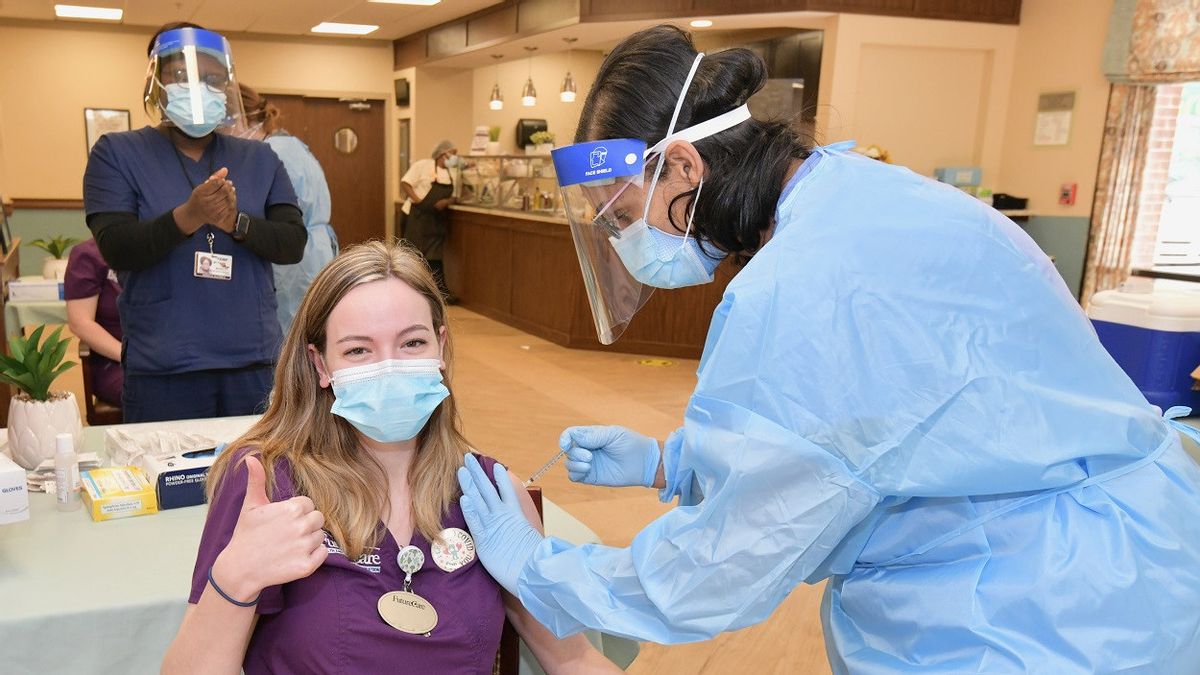JAKARTA - The low vaccination rate for the latest variants of COVID-19 and influenza has caused an increase in cases and put pressure on health services this winter, world health officials said.
The United States, a number of European countries and several other countries in the world have reported an increase in the number of inpatients related to respiratory tract infections in recent weeks.
Furthermore, the death rate among the elderly has also increased in several areas, but is far below the peak of the COVID-19 pandemic.
In anticipation, the Spanish government has reimposed the requirements for wearing masks in health facilities, as have several hospital networks in the US.
"Too many people need serious medical treatment to deal with the flu, for COVID, when we can prevent it," said Maria van Kerkhove, interim director of epidemic preparedness and the World Health Organization (WHO) pandemic.
He said vaccination rates against flu and COVID were "very low" in many countries this winter, as the world tries to get through the existing pandemic and restrictions.
Meanwhile, infectious disease experts and health officials assess that the government is still having difficulty communicating the risks that are still being posed by COVID and the benefits of vaccination since the global public health emergency was announced in May 2023.
Only 19.4 percent of US adults have received the COVID vaccine this season based on the National Immunization Survey of the Centers for Disease Control (CDC) and US Prevention, despite recommendations for all adults to get the latest injections to protect against serious illness.
Compare it with 17 percent of adults who get a booster bivalent in the 2022-2023 season, based on actual vaccine data reported to the CDC by the state.
Nearly half of US adults over the age of 18 have been vaccinated against the flu this season (44.9 percent), roughly the same as last year (44 percent), according to the CDC.
"We don't think there are enough people to get the latest COVID vaccine," CDC DirectorOK Cohen said in an interview.
"People still don't understand that COVID is still a more severe disease than the flu," he said.
Most of the newest vaccines used in the US and the European Union were made by Pfizer with BioNTech or Moderna.
In Europe, the flu spread rate is higher than COVID, the European Center for Disease Prevention and Control (ECDC) said. In total, 24 percent of representative test samples yielded positive results in the last week of 2023, up from 19 percent in the previous two weeks.
This figure is in line with the previous flu season, said ECDC respiratory virus expert Edoardo Colzani. "But now we see COVID-19 as a new unwanted guest", he said.
The ECDC does not have a vaccination rate on the continent for flu or COVID, but Colzani said preliminary data showed the use of the COVID vaccine was well below the pandemic level.
In Europe, the new COVID-19 vaccine is only recommended for high-risk groups, such as the elderly and people with a weak immune system.
Among these groups, WHO says there must be 100 percent coverage. COVID-19 levels have also increased in the southern hemisphere during the summer, the WHO said, as this virus has not yet become a seasonal virus.
Last month, 850,000 new COVID cases and 118,000 new hospitalizations were reported globally, an increase from November of 52 percent and 23 percent, respectively, according to WHO, adding the actual figure was most likely higher.
SEE ALSO:
Vaccines are still very effective at preventing serious disease, although they do not block infections, experts say.
A recent study in the journal 'Lancet Infectious Diseases' from the Karolinska Institutet and the Danderyd Hospital in Sweden found that the latest vaccine, which targets the XBB coronavirus variant. 1.5, reduces the risk of hospitalization due to COVID by 76.1 percent in people affected by the newer variant, based on public health records from adults over 65.
Meanwhile, this year's flu vaccine, made by various manufacturers, is estimated to reduce the risk of hospitalization by 52 percent.
The English, Chinese, Japanese, Arabic, and French versions are automatically generated by the AI. So there may still be inaccuracies in translating, please always see Indonesian as our main language. (system supported by DigitalSiber.id)


















